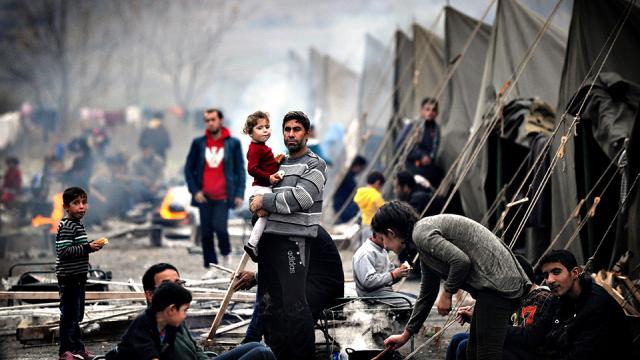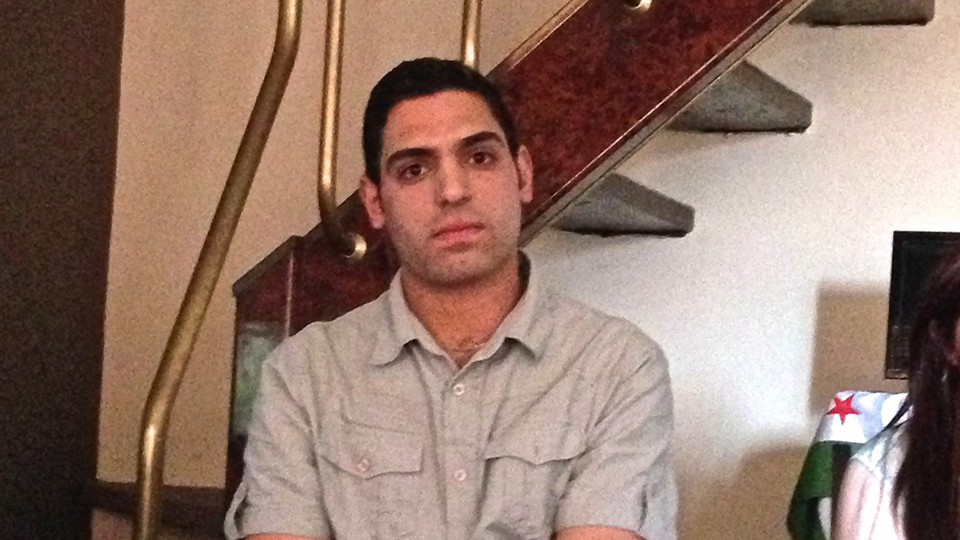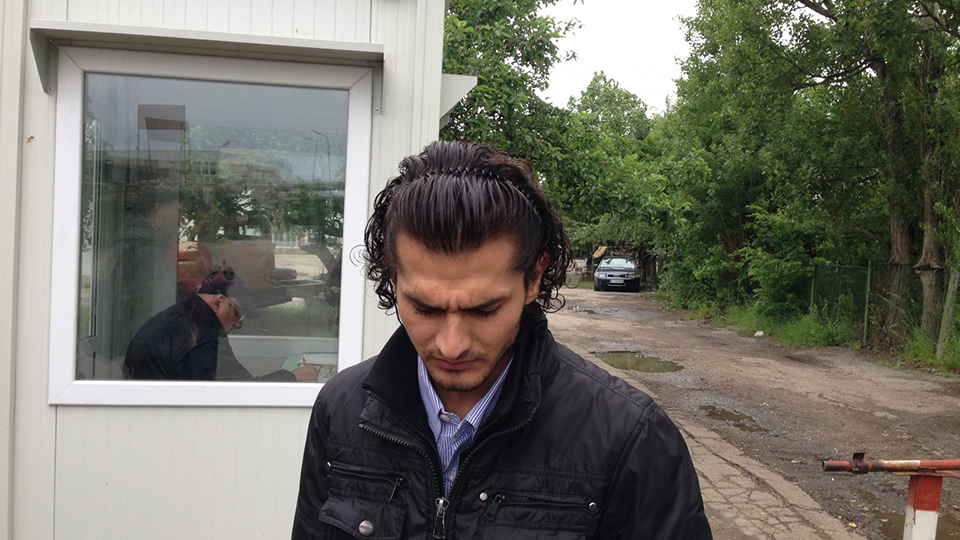
Fleeing the Syrian civil war last year, Barzan Ramo braved bullets and bombs, sweltering deserts and snowy mountains.
When he finally reached the promised land of Europe, he found himself sleeping on the floor of a disused Bulgarian school with $45 in his pocket and little chance of finding asylum in Germany, Sweden or the other countries he’d been dreaming about in Qamishli, his hometown in northeastern Syria.
“I expected we would die here,” said Ramo, 25, as he stood outside the communist-era school in Ovcha Kupel, a dingy industrial district on the outskirts of Sofia. “We made a tent from blankets in the school. We burned fires inside. There was no heat, no water.”
Today, eight months after his arrival, life still isn’t easy for Ramo or the thousands of other refugees who’ve come to Bulgaria since last year to escape fighting between rebels and forces loyal to Syrian President Bashar al-Assad.
Around a third of the 11,000 refugees who came to Bulgaria in 2013 still don’t have official status, so they can’t travel West, trapping them in the European Union’s poorest, most corrupt and arguably most racist country at a time when far right, xenophobic politicians are gaining power throughout the continent.
Others like Ramo have been granted a form of asylum that allows them to stay in Bulgaria but won’t let them leave. If they can’t find local work, they become homeless or stay in camps located throughout the country and remain dependent on the Bulgarian government for food, shelter and a monthly stipend of 65 Bulgarian lev, the equivalent of $45.
Activists Stepping In
But the refugees have increasingly found relief with Bulgarian activists who took to the streets last year to protest against the oligarchs who control the country. Where the government, Red Cross and other institutions failed to provide humanitarian assistance — or, more recently, ignored stranded refugees trying to integrate into Bulgarian society — the activists have made headway.
Many of the Bulgarian citizens who coordinated street demonstrations and months of occupying the plaza in front of parliament in Sofia later brought food, blankets and other supplies to the shuttered, communist-era military bases that were converted into refugee camps for Syrians crossing the border from Turkey.
To the protesters who first forced former Prime Minister Boyko Borisov to resign and, later, to convince parliament to fire then-23-year-old media mogul Delyan Peevski as chief of Bulgaria’s counterintelligence agency, it was a matter of someone taking action to prevent thousands of Syrians in tent cities and old barracks from starving or dying of exposure.
“The government was unprepared. They didn’t want to accept refugees, but they were forced to," said Yavor Siderov, a historian and member of Friends of the Refugees, a loose-knit group of activists which ferried supplies to the camps when the government was overwhelmed by the influx of Syrians over the Turkish border. "These guys did not have a concept, a plan, an idea of what to do,”
Friends of the Refugees started as a Facebook page for Bulgarians who wanted a venue to express their outrage over the government’s lackluster response to the refugee crisis. “The political parties were completely caught by surprise,” said Siderov. “For months, not one political party had a position on the issue.”
Today, the group maintains a warehouse stocked with goods and a network of dedicated volunteers, whose organizational wherewithal enabled them to truck aid to nearby Serbia in early May when floods inundated the Balkan country, displacing tens of thousands of people.
The group’s mission, meanwhile, has evolved beyond helping the refugees who now receive the bare necessities for survival. And conditions in the refugee camps, meanwhile, have improved. Using emergency European Union aid, the Bulgarian government brought heat and water to the camps, including the old school where Ramo still lives. Sofia has also processed thousands of asylum applications, allowing some refugees to travel elsewhere in Europe or find work and accommodations within the country, decreasing the burden on the camps.
But all is still not well. In April, Human Rights Watch released a report that accused the Bulgarian government of adopting a policy late last year to violently repel refugees of all stripes trying to cross the border from Turkey – including using dogs and batons and building a 33-kilometer-long fence in a bid not to repeat the crisis and negative attention generated last year.
“While on the border, two Bulgarian police hit me with truncheons in the face and on my neck,” the report states, quoting a Syrian refugee. “Several more police came, I don’t know how many, and also started hitting me with their truncheons. I was beaten because I crossed the border and was told to leave. They beat me so bad that I fainted for a few moments and my vision became all blurry afterwards.”
A spokesman for Bulgaria's State Agency for Refugees, Vasil Danov, admitted that the refugee camps were in poor condition when the Syrians first started arriving. But he said the Human Rights Watch report unfairly painted Bulgarian border guards as cruel oppressors for their efforts to screen out potential terrorists. Danov had a point: In 2012, a suicide bomber blew up a bus full of Israelis in the Black Sea city of Burgas.
Danov, however, also mentioned a topic that’s become central to Bulgarian activists’ most recent efforts. “We are a poor country,” he said. “Our government does not have the resources to give them a good life.”
Indeed, the Human Rights Watch report described harrowing social conditions among the refugees slated to remain Bulgaria — including mixing unaccompanied children with adult detainees, and fights breaking out between political groups.
Ramos echoed the report's concerns. “Fighting happens,” he said. “Everyone is crushed inside. Everyone is stressed.”
Other Syrians who have secured asylum that keeps them confined to Bulgaria complain of problems outside the camps, too. “People have said racist slogans here,” said Ahmad Hmude, 26. “But we don’t know the language. We can tell by their faces that they are saying nasty things to us. We just walk by.”
In April, villagers in Rosovo protested against three Syrian refugees families who moved into town, forcing the families out. The villagers displayed a form of racism seen as typical in a country whose national identity is based on its struggle for independence against the Ottoman Empire, the Islamic precursor of modern Turkey.
“They said they are proud because they are a pure ethnic village, which means these people have the belief that Bulgarian nationality is only ethnic Bulgarians,” said Zornitsa Stoilova, a journalist with Capital Weekly, an independent newspaper. “It is not their fault because Bulgarian history books don’t say Bulgaria is multinational and always has been.”
A member of Friends of the Refugees and an ethnic Syrian who lived in Bulgaria for years, Shadi Martini said he believed far-right Bulgarian parties like Ataka might have organized the demonstrations against the villagers in an attempt to stoke up hatreds and score political points.
“We believe there is a manipulation of these racist attitudes,” said Martini. “Why would the Syrian families go there if they knew they weren’t wanted? As soon as they showed up, the protests started. It doesn’t make sense.”
The longstanding Arab community in Sofia has been instrumental in working with Friends of the Refugees to find the exiles work and a place to stay, said Shadi. He and his fellow activists are raising funds to purchase a house where refugees might be able to take Bulgarian classes, share contacts for jobs, stay temporarily and find other help.
A refugee named Elias Sulieman who works in a call center in Sofia, and who speaks Spanish because he attended university in Cuba, said he was lucky to have a job and an apartment that he shares with another refugee. But he didn’t care about learning Bulgarian or integrating. His job was unsatisfying, he said, and barely paid him enough to live.
“The idea wasn’t to stay in Bulgaria,” said Sulieman, 31. “It was just a crossing point. I wanted to go to Western Europe or Canada or something.”
3 WAYS TO SHOW YOUR SUPPORT
- Log in to post comments















